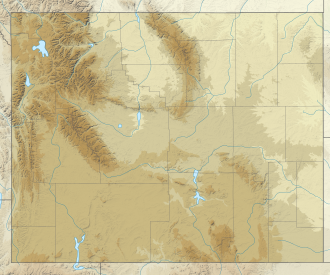This article includes a list of references, related reading, or external links, but its sources remain unclear because it lacks inline citations .(May 2016) |
| Flaming Gorge Reservoir | |
|---|---|
 Flaming Gorge Reservoir in Utah | |
| Location | Sweetwater County, Wyoming / Daggett County, Utah, US |
| Coordinates | 41°09′41″N109°33′04″W / 41.16139°N 109.55111°W |
| Lake type | Hydroelectric reservoir |
| Primary inflows | Green River Henrys Fork |
| Primary outflows | Green River |
| Catchment area | 39,100 km2 (15,100 sq. miles) |
| Basin countries | United States |
| Surface area | 42,020 acres (170 km2) |
| Water volume | 3,788,900 acre⋅ft (4.6735 km3) |
| Surface elevation | 6,040 ft (1841 m) |
| Settlements | Manila, Utah; Dutch John, Utah; Green River, Wyoming |
Flaming Gorge Reservoir is the largest reservoir in Wyoming, on the Green River, impounded behind the Flaming Gorge Dam. Construction on the dam began in 1958 and was completed in 1964. The reservoir stores 3,788,900 acre-feet (4.6735×109 m3) of water when measured at an elevation of 6,040 feet (1,841 m) above sea-level (maximum).









